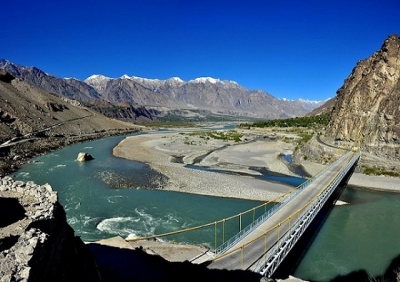Massive deforestation in PoK increases landslides, amplifies flooding: Report
By IANS | Updated: September 3, 2025 18:35 IST2025-09-03T18:31:34+5:302025-09-03T18:35:31+5:30
Islamabad, Sep 3 Citing the recent Google Earth satellite imagery of the Neelum Valley, a report has indicated ...

Massive deforestation in PoK increases landslides, amplifies flooding: Report
Islamabad, Sep 3 Citing the recent Google Earth satellite imagery of the Neelum Valley, a report has indicated the ongoing massive deforestation in several areas of Pakistan-occupied Kashmir (PoK) which were once large areas of lush woodlands but are now stripped bare due to illegal logging carried out by the timber mafia in collaboration with elements of the Pakistani army and government officials.
This large-scale tree-cutting driven by profit motive to fill state coffers has not only impacted the landscape but also exacerbated natural disasters like floods and landslides in the region, the Indian Defence Research Wing (IDRW) said in a report. The imagery, captured in high resolution and shared on social media and environmental forums shows locations like Bugna Pain and the broader Neelum Valley, including the now barren and eroded slopes in the PoK.
"Experts attribute this to Pakistan's lax enforcement of forest laws, where the timber mafia-organised criminal networks with deep ties to politics and the military-operates with impunity," the report states.
It mentions that Pakistan's timber mafia targets healthy conifers like deodar, pine, and cedar for lucrative export to urban markets.
Between 2006 and 2014, windfall policies in Chitral and Neelum designated 8.8 million cubic feet of trees for "legal" harvesting, yet significant amounts of healthy timber was smuggled out, depriving local residents of their royalties and accelerating environmental damage. The IUCN's 1998 study described FDC as "an agency to award logging contracts to the very contractors it was meant to replace," with army protection shielding operations from scrutiny.
The IDRW report stated, "Pakistan's timber mafia, a shadowy syndicate worth billions annually, has long been accused of systematic deforestation in PoK, particularly in resource-rich areas like Neelum Valley. Operating under the guise of 'windfall policies' that allow the marking and felling of supposedly damaged trees, the mafia targets healthy conifers such as deodar, pine, and cedar for lucrative export to urban markets in Pakistan and beyond. Satellite data from Global Forest Watch indicates that PoK lost over six per cent of its forest cover between 2000 and 2020, with Neelum Valley alone witnessing a 15-20 per cent reduction due to illegal harvesting. This equates to thousands of hectares cleared, often with the tacit approval or direct involvement of local authorities. Reports from environmental NGOs like the International Union for Conservation of Nature (IUCN) and the local whistleblowers reveal Pakistani army's role in supervising or protecting these operations."
"In PoK, military presence is pervasive, ostensibly for security along the LoC, but critics allege it facilitates logging by providing armed escorts for timber convoys and intimidating locals who protest. A 2023 Dialogue Earth investigation in Neelum District noted that 68 per cent of PoK's forests are in the area, home to 42,000 families, yet illegal smuggling of high-value cedar wood-worth up to 10,000 Pakistani rupees (USD 36) per cubic foot-continues unabated, often under army oversight to 'secure' routes," the report added.
Deforestation in PoK has caused soil erosion, increased landslide risks, and amplified flooding as was witnessed during the Pakistan floods in 2022, when denuded hills in Neelum Valley contributed to the deluge impacting millions. The Neelum, which was once home to species like the Markhor and Himalayan black bear-now face extinction threats.
Disclaimer: This post has been auto-published from an agency feed without any modifications to the text and has not been reviewed by an editor
Open in app